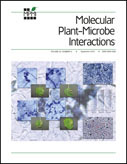The Ustilago maydis Forkhead Transcription Factor Fox1 Is Involved in the Regulation of Genes Required for the Attenuation of Plant Defenses During Pathogenic Development. [Mol Plant Microbe Interact. 2010 Sep;23(9):1118-29.]
Zahiri A, Heimel K, Wahl R, Rath M, Kämper J.
Abstract
Ustilago maydis is a plant-pathogenic fungus that establishes a biotrophic relationship with its host plant, Zea mays. The pathogenic stage of U. maydis is initiated by the fusion of two haploid cells, resulting in the formation of a dikaryotic hypha that invades the plant cell. The switch from saprophytic, yeast-like cells to the biotrophic hyphae requires the complex regulation of a multitude of biological processes to constitute the compatible host-fungus interaction. Transcriptional regulators involved in the establishment of the infectious dikaryon and penetration of the host tissue have been identified; however, regulators required during the post-penetration stages remained to be elucidated. In this study, we report the identification of a U. maydis forkhead transcription factor, Fox1, which is exclusively expressed during biotrophic development. Deletion of fox1 results in reduced virulence and impaired tumor development. The Deltafox1 hyphae induce the accumulation of H(2)O(2) in and around infected cells and a maize defense response phenotypically represented by the encasement of proliferating hyphae in a cellulose-containing matrix. The phenotype can be attributed to the fox1-dependent deregulation of several effector genes that are linked to pathogenic development and host defense suppression.


